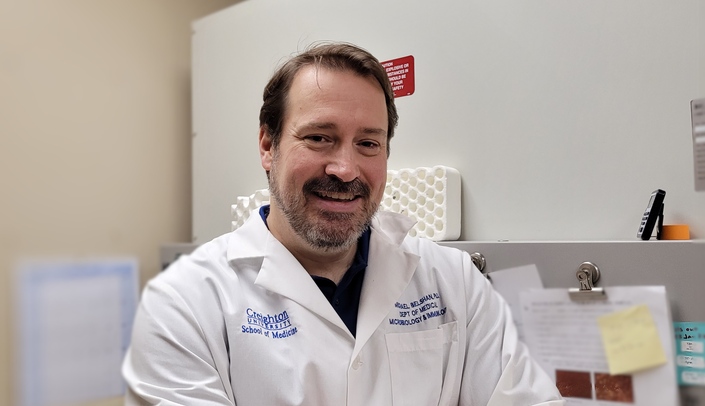Growing up in a working-class neighborhood in Elgin, Illinois, Michael Belshan, PhD, dreamt of pursuing a career in zoology.
"I loved watching those Sunday morning animal shows and remember thinking, that’s what I want to do I want to host an animal show on television," said Dr. Belshan, who is professor of medical microbiology and immunology at Creighton University.
Fortunately, the new INBRE Infectious Diseases Scientific Director, went another direction, one that led him through a stint as a math, then physics, then education major, and landed him with a zoology degree from Iowa State and eventually in grad school pursuing a PhD in molecular cellular biology.
It was while he was pursuing his doctoral degree at Iowa State, that Dr. Belshan happened to rotate through a virology lab studying viral equine infectious anemia.
"What stuck with me during this rotation was the idea that you were working toward a treatment or cure for the disease and I was hooked," he said.
Dr. Belshan ended up doing his post-doc work in HIV at Washington University where he landed a National Institutes of Health fellowship allowing him to pursue his research on HIV II before being recruited to Creighton University for his virology expertise.
Dr. Belshan continued his research on HIV molecular virology and host cell interactions, collaborating with Charles Wood, PhD, the former director of the Nebraska Center for Virology at the University of Nebraska-Lincoln and publishing a paper together on HIV latency.
When the pandemic hit in early 2020, Dr. Belshan’s research pivoted to focus on sequencing surveillance in Nebraska, as well as evolution of the COVID-19 strains and viral diversity.
"Interestingly, research on viral and genetic diversity is something I did when I studied equine infectious anemia, so it made sense to focus on the evolution of the COVID-19 virus," he said.
Throughout Dr. Belshan has included students as integral parts of his laboratory team.
Since 2006, Dr. Belshan has mentored 5 INBRE Scholars in his lab and countless others not involved in the INBRE program.
"I’ve had some really good students come through my lab and I am always working to encourage them to continue to pursue their research as well as to consider staying in Nebraska to do so," he said, adding, "You want to keep them here you don’t want a brain drain."
Dr. Belshan said he especially enjoys the time he gets to spend with the INBRE students during their summer research experience.
"It keeps me fresh and helps me look at the research in new and interesting ways," he said.
